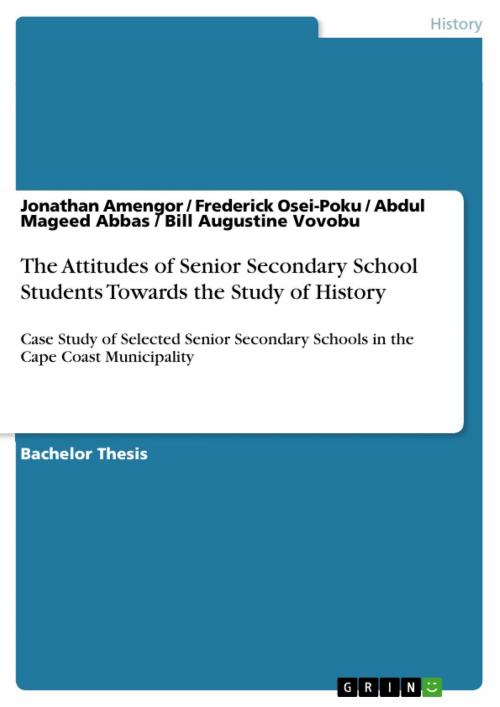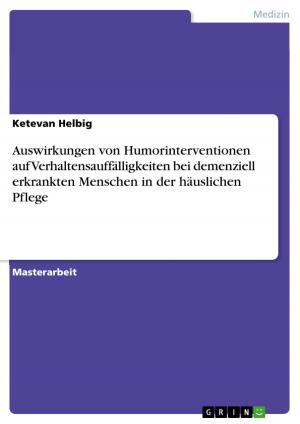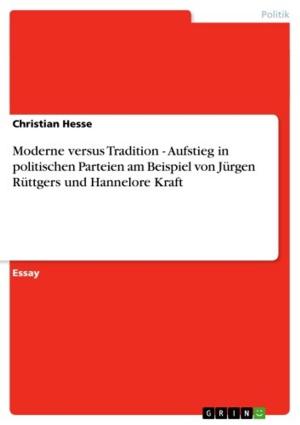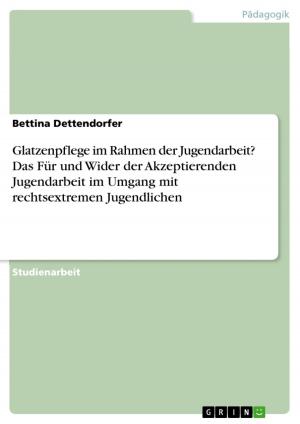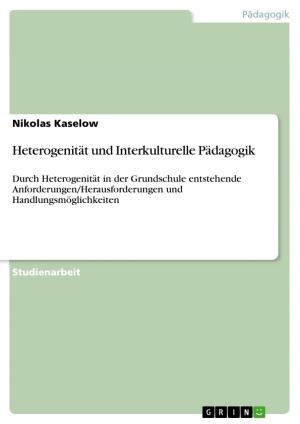The Attitudes of Senior Secondary School Students Towards the Study of History
Case Study of Selected Senior Secondary Schools in the Cape Coast Municipality
Nonfiction, History| Author: | Abdul Mageed Abbas, Frederick Osei-Poku, Bill Augustine Vovobu, Jonathan Amengor | ISBN: | 9783668573727 |
| Publisher: | GRIN Verlag | Publication: | November 17, 2017 |
| Imprint: | GRIN Verlag | Language: | English |
| Author: | Abdul Mageed Abbas, Frederick Osei-Poku, Bill Augustine Vovobu, Jonathan Amengor |
| ISBN: | 9783668573727 |
| Publisher: | GRIN Verlag |
| Publication: | November 17, 2017 |
| Imprint: | GRIN Verlag |
| Language: | English |
Bachelor Thesis from the year 2007 in the subject History - Didactics, grade: A, University of Cape Coast (DEPARTMENT OF ARTS AND SOCIAL SCIENCES EDUCATION (DASSE)), course: Project for History, language: English, abstract: Knowledge of one's heritage is one of the most cherished ideals in a society. This creates the awareness of how the people lived in the past - the way they dressed, the way they danced, the food they ate, their economic resources and how they passed on the above cultural values to their future generations. In many African indigenous settings, for instance, the cultural heritage such as festivals, religion, languages spoken and even the type of education they practiced all have their meanings and have evolved from the past. It is therefore obvious that to understand the present, we must definitely know the past. It is only based on the knowledge of the past that we can predict the future and live fruitful lives based on the past circumstances. The primary aim of History teaching in Africa is to put the African child into the stream of History from which he has been absent for so long. People do not accord it the necessary attention it deserves. This is fundamentally due to the little importance attached to it. Consequently, students are not aware of their past and yet they seemed not to be perturbed. A questionnaire was administered to 180 respondents were randomly sampled from three High Schools in Cape Coast Municipality of Ghana. SPSS was used to conduct descriptive statistics on the data collected from the respondents. The results show that students offer history because of their interest in the subject. Their offering history has nothing to do with advice from parents, friends and its easiness as a subject of study. Unfortunately, the resources available in the three High schools are awfully inadequate. The predominant teaching method is a combination of lecture method, dictation of notes and the use of visual aids and the discussion method. However, another equally important methods such as excursion were not being employed in the teaching of history. This may be due to financial constraints and lack of cooperation from the schools' administration. It is therefore recommended that history as a subject should be made compulsory for at least a year in the High Schools. The government must also resource teachers to deliver the subjects using all the necessary teaching methods. Teachers of the subjects should also improvise in the face of lack of resources in teaching the subject.
Amengor Jonathan is a Technology Educator and manager at Morgan International Community School. He holds first degree (Bachelor of Education in Arts) and second degree (Master of Education in I.T.) from the University of Cape Coast, Ghana. He is the executive director of Mersam Consult, an IT consulting firm in Ghana. His research interest is the investigation of the dynamics of implementing technology into the curriculum , the role , challenges and he way forward.
Bachelor Thesis from the year 2007 in the subject History - Didactics, grade: A, University of Cape Coast (DEPARTMENT OF ARTS AND SOCIAL SCIENCES EDUCATION (DASSE)), course: Project for History, language: English, abstract: Knowledge of one's heritage is one of the most cherished ideals in a society. This creates the awareness of how the people lived in the past - the way they dressed, the way they danced, the food they ate, their economic resources and how they passed on the above cultural values to their future generations. In many African indigenous settings, for instance, the cultural heritage such as festivals, religion, languages spoken and even the type of education they practiced all have their meanings and have evolved from the past. It is therefore obvious that to understand the present, we must definitely know the past. It is only based on the knowledge of the past that we can predict the future and live fruitful lives based on the past circumstances. The primary aim of History teaching in Africa is to put the African child into the stream of History from which he has been absent for so long. People do not accord it the necessary attention it deserves. This is fundamentally due to the little importance attached to it. Consequently, students are not aware of their past and yet they seemed not to be perturbed. A questionnaire was administered to 180 respondents were randomly sampled from three High Schools in Cape Coast Municipality of Ghana. SPSS was used to conduct descriptive statistics on the data collected from the respondents. The results show that students offer history because of their interest in the subject. Their offering history has nothing to do with advice from parents, friends and its easiness as a subject of study. Unfortunately, the resources available in the three High schools are awfully inadequate. The predominant teaching method is a combination of lecture method, dictation of notes and the use of visual aids and the discussion method. However, another equally important methods such as excursion were not being employed in the teaching of history. This may be due to financial constraints and lack of cooperation from the schools' administration. It is therefore recommended that history as a subject should be made compulsory for at least a year in the High Schools. The government must also resource teachers to deliver the subjects using all the necessary teaching methods. Teachers of the subjects should also improvise in the face of lack of resources in teaching the subject.
Amengor Jonathan is a Technology Educator and manager at Morgan International Community School. He holds first degree (Bachelor of Education in Arts) and second degree (Master of Education in I.T.) from the University of Cape Coast, Ghana. He is the executive director of Mersam Consult, an IT consulting firm in Ghana. His research interest is the investigation of the dynamics of implementing technology into the curriculum , the role , challenges and he way forward.
